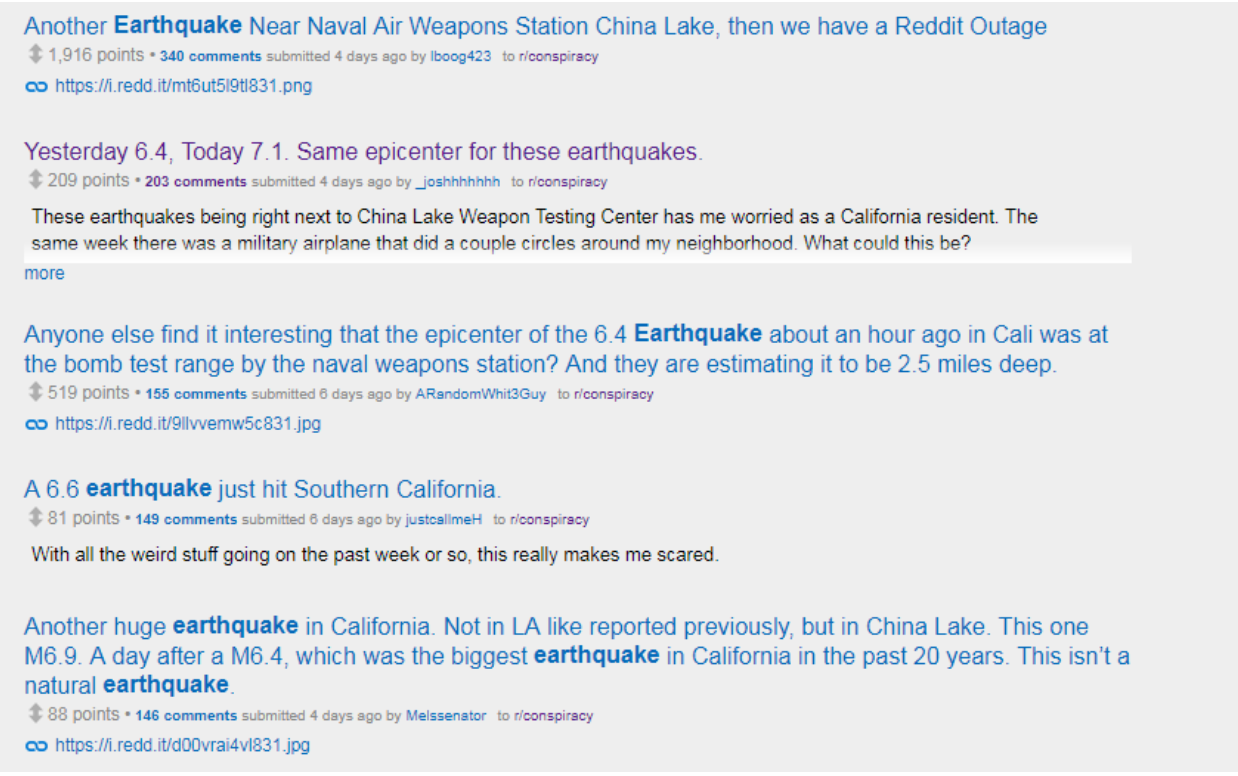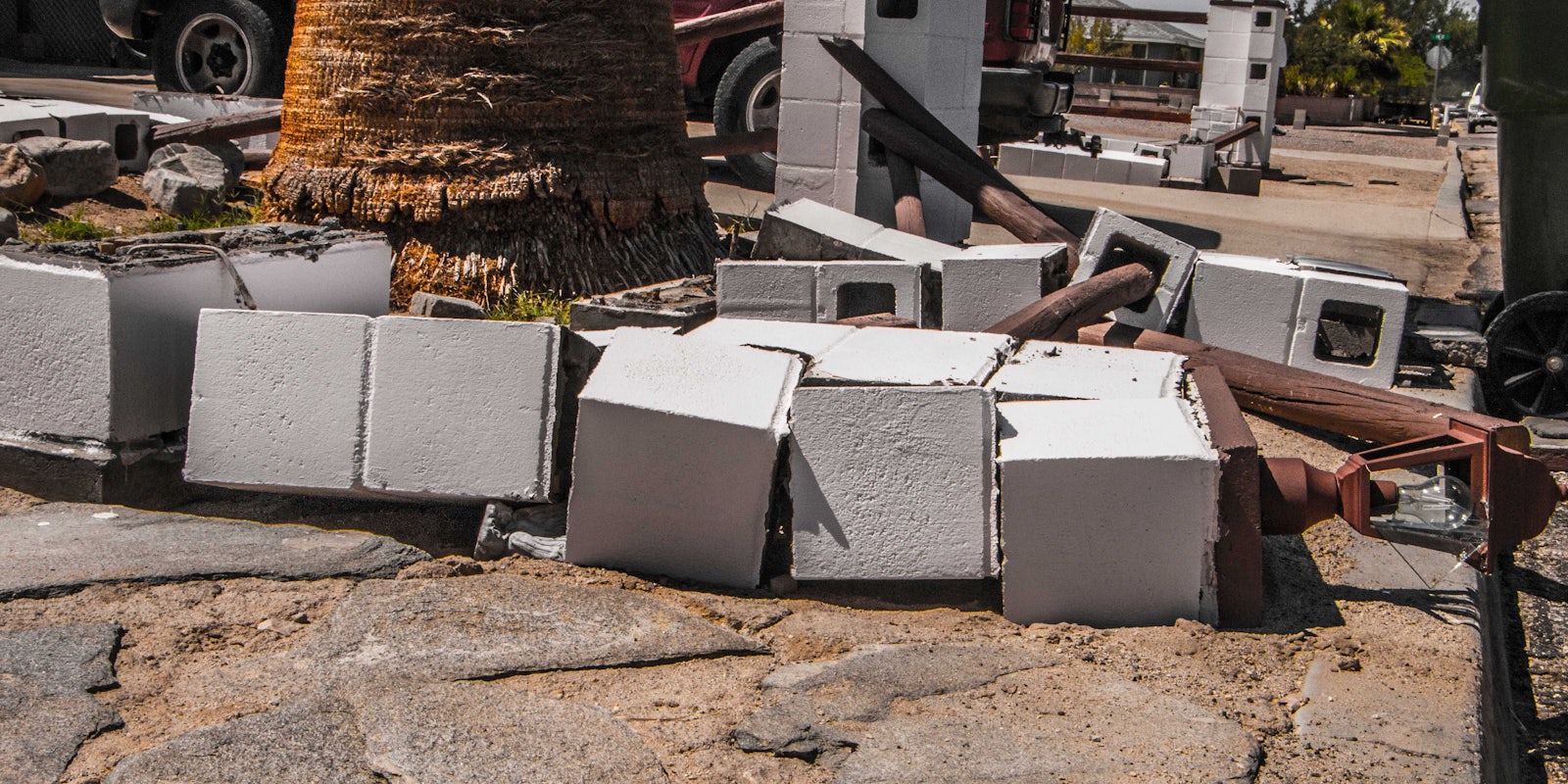Did earthquakes exist before humans had the ability to create earthquakes?
Of course, humans don’t have the ability to create earthquakes, other than extremely minor ground shakings after large explosions. And the earliest recorded earthquake took place at Mount Tai in China sometime between the 18th and 17th Century BCE.
But given that the conspiracy theory community has ascribed virtually every major natural disaster of the last few decades to a ruling cabal desperately in need of distractions, it’s a question that’s worth asking. If modern earthquakes are all engineered by humans, what were ancient earthquakes? Do natural earthquakes still happen?
Most people would see these questions—and the very notion of Powers That Be creating earthquakes to get bad news off the front page—as asinine.
But after the two massive earthquakes that hit Southern California on July 4 and 5, conspiracy theories about what the ground shakers were “really” about sprouted up all over social media. Was it an underground nuke being tested? Some kind of occult ceremony? A massive shiny object meant to distract us from… something?
Btw, the Cali earthquake’s epicenter wasn’t just “near” the Naval weapons base at China Lake.
— Foley Art Center (@foleyartcenter) July 5, 2019
IT WAS THE EPICENTER.
It occured 1 mile directly beneath it. https://t.co/fWzlN3mnNu
Here’s some info on AWESOME “China Lake” Military base that was hit with we will call them “earthquakes” even though I doubt that’s what they are. credit Fritz Springmeyer (how is that man still alive?) pic.twitter.com/mSHGHND0ze
— Kimberly McGeorge, Frequency Master (@serenewellness) July 6, 2019
https://twitter.com/VictoriaRGates/status/1147392730261327872
This rampant speculation shares a number of characteristics with the conspiracy theories that the California forest fires were set by directed energy weapons from space.
Both rely on a fundamental misunderstanding of how science and nature work, a need to ascribe sinister motives to natural events (trees rarely burn during wildfires because their trunks are full of water, for example), and on claiming things that “don’t make sense” are only possible through artificial intervention. They revolve around the practical application of technology not known to exist, for purposes that aren’t clear.
On July 4 and 5, the area around the small town of Ridgecrest, California, was rocked by two large and hundreds of smaller earthquakes, with the worst topping out at magnitude 7.1. Notably, these earthquakes were not on the San Andreas Fault, the site of where California’s long-feared “Big One” will likely occur; but one of a number of smaller faults clustered in the area.
Drone Footage of Fissures After The 7.1 Earthquake in Ridgecrest California.
— ∼Marietta (@MariettaDaviz) July 7, 2019
Naval Air Weapons Station China Lake Said That Nonessential Workers Were Evacuated & Operations Halted Since The ‘2 Faults, 1 Epicenter’ Quakes Were On The Base.#Earthquake 🤔 pic.twitter.com/RDpRz6O3yG
Those faults, and the quakes one of them produced, happen to have taken place in the large swath of land owned by the U.S. Navy, the Naval Air Weapons Station China Lake. With nearly 20,000 square miles of restricted air space surrounding the base, China Lake is the hub of the Navy’s weapons research and testing arm, responsible for front line weapons like the AIM-9 Sidewinder missile and the Tomahawk cruise missile—as well as an unknown number of classified projects.
When a massive earthquake takes place at a mysterious weapons testing range, it’s natural that eyebrows will be raised in a conspiracy theory community that already believes in “tectonic weapons.” And so Reddit’s r/conspiracy forum and conspiracy-minded Twitter accounts quickly filled up with threads questioning whether two major earthquakes could happen in the same place so quickly together—a place that JUST HAPPENS to be a massive weapons testing range.
Coincidence? Silly normie, there are no coincidences.

To be clear, there is no known technology for creating earthquakes out of nothing. And while it’s tempting to say that two massive earthquakes under a naval weapons testing site could have been nuclear weapons being set off deep within the earth, there’s no evidence that this is true, either. In fact, there’s a great deal of evidence that the quakes were neither some new weapon being tested or a nuke being set off under the China Lake base.
It’s impossible to know whether the U.S. has some kind of highly classified earthquake tech. But to assume it’s real, and that these quakes were caused by it, resides in the realm of special pleading, the fallacy where we make up exceptions to rules in order to explain something we don’t understand. And the origin of these earthquakes is fairly easy to understand without a special pleading explanation like wonder weapons or nuclear bombs.
For one, China Lake has never been the site of a nuclear test, either above or below ground. The Navy also didn’t routinely test nuclear weapons, and there hasn’t been a known U.S. nuclear test since 1992. If a nuclear weapon was tested there, it would fly in the face of test ban treaties and the very purpose of naval weapons testing, which is mostly shooting down airplanes and blowing up ships. However, it is a huge base, and California is both earthquake-prone and overdue for a large quake, meaning it shouldn’t surprise anyone that this was were several large earthquakes were centered.
Beyond that, no amount of nuclear weapons testing, or testing of any known weapon, can create an earthquake that big. The North Korean nuclear test of 2017 was reported to have created an earthquake of about magnitude 6, but it’s not clear if the seismic activity was an actual earthquake (North Korea has no major fault lines) or vibrations from the test that felt similar. And such a blast would create devastating above-ground damage, given that the mountain above where the North Korean test took place collapsed.
In the case of the Ridgecrest quakes, there are clear signs of earthquakes hitting the area, including a massively ruptured fault line easily visible from the air.
Excellent views of the NW-trending fault rupture from my seat in a US Navy Night Hawk helicopter 🚁 Measured up to 6’ of right-lateral offset on the China Lake NWAS base. #earthquake #Ridgecrest pic.twitter.com/vWl71Q56S5
— Brian Olson 🥥🌴🗳️ (@mrbrianolson) July 7, 2019
The reason we know so much about North Korea’s test is that underground nuclear weapons testing creates a massive footprint of excavated dirt and rock—it’s so blatant that we can see it from space when North Korea is preparing to test a weapon.
Concealing this kind of excavation in a site only about 120 miles from Los Angeles would be impossible. The stuff has to go somewhere and be transported by someone.
Finally, the first earthquake left China Lake in a status of being “not mission capable” and it was already closed and partially evacuated when the second quake hit. The base has since re-opened, but only to essential personnel, and with a substantial amount of damage unrepaired. Why would the Navy damage its own base with a huge earthquake, then do it again?
To believe that nuclear weapons or some other kind of doomsday device caused these quakes is to believe that the staff of China Lake made a gigantic amount of earth disappear after digging huge tunnels to set off an impossibly large weapon that left no trace of radioactivity, thereby damaging the naval base and preventing it from carrying out its other missions.
And then they did it again, both times in flagrant violation of a treaty the U.S. signed in good faith, and for no particular reason. Either that, or these were real earthquakes that hit Southern California, one on top of the other, like earthquakes tend to do.
READ MORE:
- The truth about Trump and Jeffrey Epstein
- How QAnon has infiltrated college football message boards
- How the QAnon movement continues without its messenger
- What were these QAnon fans doing posing at Guantanamo Bay?
Got five minutes? We’d love to hear from you. Help shape our journalism and be entered to win an Amazon gift card by filling out our 2019 reader survey.


